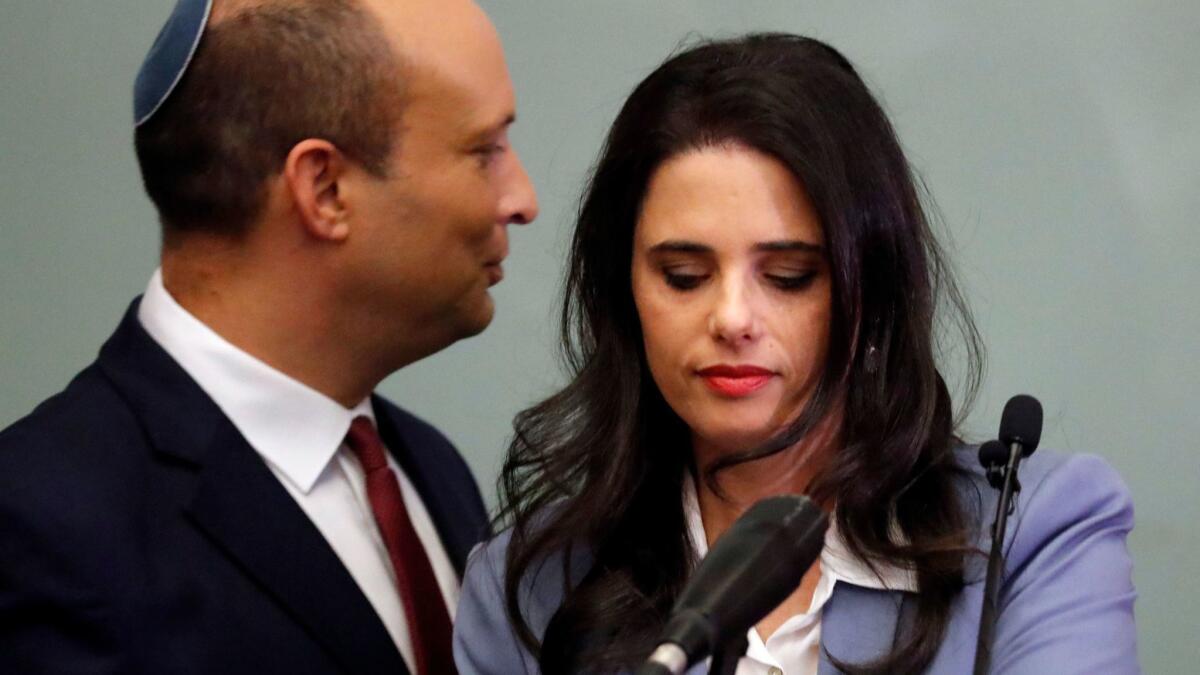Netanyahu’s government holds together, for now, as key partner says he won’t quit coalition

Israeli Prime Minister Benjamin Netanyahu, celebrated among his supporters as “the magician,” appeared to have once again pulled victory from the jaws of defeat Monday as a senior member of his coalition withdrew the threat of resignation, which could have brought down his government and triggered early elections.
In a high-stakes battle, Netanyahu persuaded his hawkish minister of education, Naftali Bennett, to retreat from his decision to resign if not appointed to serve as defense minister.
Israel’s coalition crisis was sparked by the surprise resignation last week of Avigdor Lieberman, the hard-line defense minister who accused Netanyahu of capitulating to terrorists by agreeing to a tacit cease-fire with Hamas, the militia ruling the Gaza Strip.
Lieberman’s withdrawal from Netanyahu’s right-wing coalition leaves the government with a parliamentary majority of just one, which signals a tumultuous period ahead as the prime minister strives to avoid calling for early elections before their scheduled date of November 2019.
Had Bennett and his Jewish Home party followed through on his threat, the government would have been left with an unmanageable minority and elections would almost certainly have been triggered for early next year.
Despite the reprieve, Israeli experts give Netanyahu’s fragile coalition little chance of long-term survival.
Netanyahu and Bennett addressed the nation in a pair of somber public appearances in which, more than anything else, each seemed to campaign to the voters.
In a Sunday evening address, Netanyahu pointed to a long list of military and political accomplishments, asserting that toppling his government would be “irresponsible.”
“We are in the midst of a battle, and in the middle of a battle we don’t abandon our posts,” Netanyahu said. “In the middle of a battle, we do not play politics. The security of the nation is beyond politics, and the security of the nation is also beyond personal considerations.”

In his own address Monday, Bennett was unwilling to be held responsible for ending the term of one of the most right-wing governments in Israeli history, with the inherent political risk.
“If the prime minister is serious in his intention, and I want to believe his words from last night, I am saying here to the prime minister we are at this moment withdrawing all of our political demands and will help you in the huge mission of making Israel win again,” Bennett said.
“I know I’ll pay a political price for this,” he acknowledged, adding, “it’s not the end of the world, you win some, you lose some.”
Response from political opponents was withering.
Yair Lapid, leader of the centrist Yesh Atid party, said of Netanyahu and Bennett that “all they care about is the political advantage they can accrue from the suffering of citizens in the south,” a reference to the public anger that greeted last week’s Gaza cease-fire, which is perceived by many Israelis as a humiliating agreement with a terrorist group.
Israelis seemed weary of political saber rattling. Speaking for some in the prime minister’s base, Victor, a Tel Aviv taxi driver and longtime Netanyahu voter who asked to be identified by his first name only, expressed resignation. “They both jerked us around for days, but in the end, who else is there to vote for but Bibi?” he asked, using the prime minister’s nickname.
Anshel Pfeffer, the author of a Netanyahu biography, said “he is perpetually in campaign mode, so he gave an elections speech. He really didn’t know if Bennett would back down.”
“Israeli politics are coalition politics,” Pfeffer said, “and Bibi is a magician at building coalitions. He’s the Likud prime minister consistently with the lowest number of legislators, but he’s the most successful at building coalitions, and to do that he needs only two things: 25% of the votes and a divided opposition. For now, he’s got it.”
For all his political skills, Netanyahu still faces the prospect of a possible indictment on corruption charges. The attorney general is expected to decide within months whether he will accept police recommendations to charge the prime minister in several corruption scandals.
Bennett, Pfeffer said, failed to contend with the magnitude of “pressure Netanyahu can create and the fear he can generate about the possibility of a right-wing political loss. Netanyahu’s full media onslaught is a daunting thing.”
Tal Schneider, the senior political analyst at the Israeli financial daily Globes, said Israelis will probably be treated to a campaign slugfest with Netanyahu and Bennett battling “over who is more right-wing, who is more nationalist.”
Schneider said Israeli voters certainly recall Netanyahu toppling his own government only a few months after the 2014 Gaza War, over a quarrel with a media outlet that was subsequently revealed to be connected to one of the criminal probes against him.
As a result, she said, “I’m not sure he’s viewed as reliable when he claims you cannot dissolve the parliament now, over ostensible security concerns.”
Tarnopolsky is a special correspondent.
More to Read
Start your day right
Sign up for Essential California for news, features and recommendations from the L.A. Times and beyond in your inbox six days a week.
You may occasionally receive promotional content from the Los Angeles Times.






